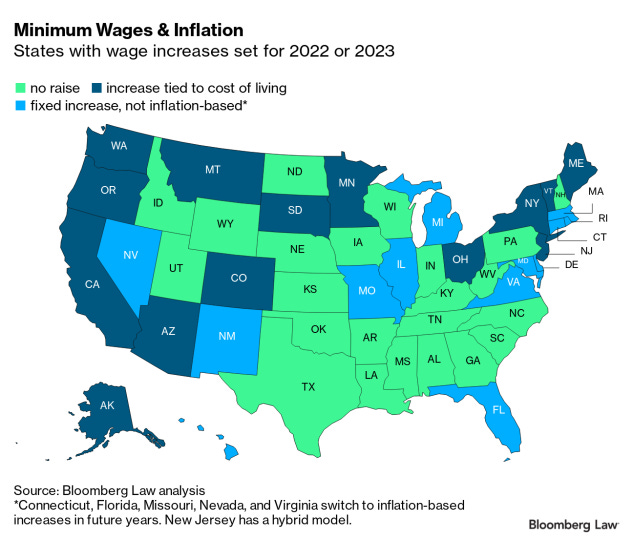Ballot Measures Affecting Workers in the 2022 Election | Roundup #8
Minimum wage, unionization, and anti-discrimination policies all up for vote

"It is one of the happy incidents of the federal system that a single courageous state may, if its citizens choose, serve as a laboratory; and try novel social and economic experiments without risk to the rest of the country."
— Supreme Court Justice Louis D. Brandeis, 1932
This is a little bit of a longer Roundup than usual! But for good reason.
Next week, Americans will head to the ballot box and, in addition to voting for their favorite candidates, they’ll also have the opportunity to directly change policy at the state and local levels through ballot initiatives. Several of these initiatives will have immediate consequences for workers and employers. They include proposals to:
increase to minimum wage levels,
eliminate the tipped minimum wage,
change unionization policy, and
end discrimination based on sex, gender identity, and sexual orientation (including in the workplace)
In this post, we'll go over these themes to better understand where states are heading on labor law. Let's dive in.
Minimum Wage Increases
The US federal minimum wage isn’t looking too hot. Its most recent change was its increase to $7.25 in 2009, after which it hasn’t budged. Given inflation (and especially record inflation over the last two years), that means that the real value of the federal minimum wage has decreased over the last 12 years. The minimum wage was meant to be a protection for this country’s low-wage workers, but due to Congressional inaction, that protection is slowly fading away.

As a result, states have been passing their own minimum wage laws to better protect workers. 30 states and Washington D.C. have minimum wages that are already higher than the federal minimum wage. A few states and localities are seeking to make further increases to their minimum wage standards.
General Minimum Wage Increases
Nebraska, Nevada, and the city of Portland, Maine have on their ballots minimum wage increases that would affect all workers. These could have a direct economic impact for a pretty broad group of workers.
What’s interesting is that, in the case of Nebraska, their proposed minimum wage increase won’t just be “one-time.” Instead, their ballot measures will increase the minimum wage each year based on the rate of inflation (called “inflation-indexing”). More and more states are indexing their minimum wages to inflation (or have some other fixed increase). Probably a lot easier than holding a vote for a new minimum wage law/ballot proposition each year!

Nevada, somewhat mysteriously, is bucking this trend. Despite increasing its minimum wage in next week’s ballot proposal, it’s also removing the inflation indexing for its minimum wage that it had in place since a 2006 ballot measure.1 Cynically, that provision seems to have been sneaked into the initiative, Trojan horse-style, as a way to get voters to undo a pretty significant labor protection. Two steps forward, one step back.
Here are the measures:
In Nebraska, a ballot measure would raise the minimum wage from $9/hr to $15/hr by 2026. Thereafter, the minimum wage will be indexed to inflation (Nebraska Initiative 433)
In Nevada, a ballot initiative would increase the minimum wage from $10.50/hr to $12/hr by 2024. It also eliminates the part of the state constitution that had partially indexed minimum wages to inflation since 2006 (Nevada Question 2)
In Portland, Maine, a ballot measure would increase the minimum wage from $13/hr to to $18/hr by 2025. Thereafter, minimum wage levels will be indexed to inflation (Portland Question D)
Minimum Wage Increases for Specific Workers
In addition, some cities in California are trying to increase the minimum wage for hotel and healthcare workers beyond the state minimum wage ($15/hr). These workers have especially recently been working in very understaffed conditions, and so are often taking on the responsibilities for more than one worker.
Normally that would qualify workers for a raise! But because the hotel and healthcare industries have become increasingly concentrated, workers have relatively low bargaining power when it comes to demanding wage increases.
As a result, a ballot proposition might currently be one of the best recourses for these workers. Here’s what they’re proposing:
In both Duarte and Inglewood City, California, two separate ballot initiative would raise the minimum wage of healthcare workers in those municipalities to $25/hr by 2024. Thereafter the minimum wages would increase with inflation (Duarte Measure J, and Inglewood City Measure HC)
In Laguna Beach, California, a ballot initiative would raise the minimum wage of hotel employees to $18/hr in 2023, increasing to $22/hr by 2026. Thereafter the minimum wages would increase with inflation (Laguna Beach Measure S)
Eliminating Tipped Minimum Wage
For tipped workers at restaurants (and other service jobs), they have a special minimum wage that's lower than the standard one. The federal tipped minimum wage is literally $2.13/hr. The rationale for having a lower minimum wage from restaurants was that customer tips were effectively income, and therefore should count towards their minimum wage. In theory, if the combined wages and tips didn't meet the standard minimum wage, then the restaurant is legally supposed to adjust their wages so that workers are whole.
In practice, though, restaurant workers often don't actually get made whole. These wage violations are widespread, enforcement is pretty lax, and so restaurants and other employers frequently get away with paying a sub-minimum wage to tipped workers. The result is that tipped workers are twice as likely to experience poverty than non-tipped workers. States that eliminate the tipped minimum wage and include them in a single minimum wage that applies to everyone (called “One fair wage”), have significantly less poverty for tipped and non-tipped workers alike.
According to a recent poll conducted by Data for Progress, a majority of voters in both parties support eliminating the tipped minimum wage loophole. 8 states have already eliminated the tipped minimum wage entirely. Next week, the tipped minimum wage will be on the chopping block in a few more jurisdictions:
In Washington, DC, a ballot measure would phase out the tipped minimum wage, increasing it gradually from $5.35/hr to be equivalent to the non-tipped minimum wage by 2027 ($16.10/hr as of October 2022, but will get adjusted for inflation). Thereafter, minimum wage levels will be indexed to inflation. (Washington, DC Initiative 82)
In Portland, Maine, a ballot measure would phase out the tipped minimum wage, increasing it gradually from $6.50/hr to to $18/hr (equivalent to the standard minimum wage) by 2025. Thereafter, minimum wage levels will be indexed to inflation. (Portland Question D)
Unionization
In the last year, we have seen a relative surge in union activity, with a landmark union election at the Amazon fulfillment warehouse in Staten Island, and the decisions at hundreds of Starbucks locations to unionize.
Democratic-leaning states have welcomed these victories and are seeking to create a more union-friendly environment. On the other hand, Republican-leaning states have tended to make it harder for unions to organize and build bargaining power.
Much of union policy at the state level revolves around "right-to-work" laws, which make it illegal for unions to require workers to pay pay union dues. Business advocates say this gives workers and businesses more choice. But union advocates say these policies unfairly handicap unions, since workers can benefit from union representation without having to pay for it (see the free rider problem). Lower union funding in right-to-work states could ultimately harm other workers.
Economic research on right-to-work states shows that they don’t increase employment like their proponents think they do, they have more hazardous work environments, and may also reduce political participation among the middle class.
28 states currently have "right-to-work" laws, with Missouri and Kentucky passing them most recently in 2017:

Two state ballot measures affecting unionization are up for vote next week:
In Illinois, a ballot measure would amend the state constitution and explicitly defend the right of workers to collectively bargain should they choose to do so. It would also expressly prohibit Illinois from passing any right-to-work laws (Illinois Amendment 1)
Tennessee, which is already a right-to-work state, will vote on a ballot proposition that would do the opposite as Illinois. It would amend the state constitution and prevent employers from requiring union membership as a precondition for employment. (Tennessee Constitutional Amendment 1)
Equal Rights
Currently, the US Constitution guarantees that its legal rights must apply equally and cannot be denied to people based on race, religion, and national origin. However, it doesn't guarantee that equal rights should be enforced regardless of a person's sex, sexual orientation, or gender identity.
Lawmakers have still been able to include non-discrimination clauses ensuring fair treatment in employment-related laws, such as the Equal Pay Act. However, without a Constitutional amendment, these laws remain vulnerable to weak enforcement by the executive branch and loose interpretation of those statutes by the judicial system.
For workers, this can have pretty significant implications. Employers that are sued for violating the Equal Pay Act, for example, are able to use a legal loophole to effectively defend discriminatory pay practices that sound impartial on the surface. Similar loopholes exist for discriminatory hiring, firing, and treatment in the workplace.
The proposed Equal Rights Amendment, which would elevate sex, gender identity, and sexual orientation to the same Constitutionally-protected status as race and religion, would help solve this problem. While politicians clear legal hurdles to pass such an amendment to the US constitution, 21 states have already taken matters in their own hands and included an ERA within their state constitutions.
One more may be in their midst: in Nevada, voters will get to decide whether to include an Equal Rights Amendment in their state constitution (Nevada Question 1)
Noteworthy Links from Last Week
NYT: ‘No Jobs Available’ - the Feast or Famine Careers of America’s Port Drivers
US Bureau of Labor Statistics: Improving estimates of hours worked for U.S. productivity measurement
More Perfect Union: Workers Plan to Renovate Home Depot with a Union
Chicago Magazine: The Illinois Workers’ Rights Amendment Ballot Measure
Oversharing: Former top Uber lobbyist says drivers should be presumed employees
Per the 2006 ballot measure that got incorporated into Nevada’s constitution, annual inflation adjustments to minimum wage were capped at 3%. As a result, its partially indexed to inflation. Given record inflation levels since 2021 (well above 3%), Nevada’s minimum wage already hasn’t been keeping pace with inflation. So if anything, a ballot measure should be reducing that cap, rather than removing the inflation adjustment altogether.


